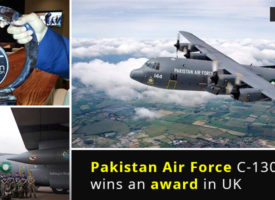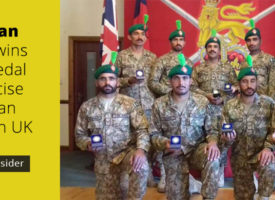On 12 June 2015, Pakistan’s Inter-Services Public Relations (ISPR) announced in its press release that the first ever Pakistan-Russia Staff Talks in military history were being held in Rawalpindi. To be more precise, with the Chairman Joint Chiefs of Staff Committee. Leading the visiting delegation is Vice Admiral Volozhinskiy Andrey Olgertovich, Deputy Chief of Main Operations and Director of the General State Armed Forces of Russian Federation.
To clarify further, since these are Joint Staff-level talks, they involve the tri-services i.e. army, navy and airforce. Being unprecedented and in such a time frame (a month before Pakistan’s possible entry as a full member state in the SCO) has raised many an eyebrow, especially in New Delhi; Indian policymakers who have long considered Moscow their strategic ally (and vice versa) are most certainly irked by these growing Pak-Russia military ties. One won’t be wrong in assuming that a series of estimates will be generated by India’s foreign and military intelligence agencies on the possible details of this visit.
Furthermore, Pakistan Army chief General Raheel Sharif is presently on an official 3-day visit to Russia where he will hold important meetings with Russian civil and military leaders, including President Vladimir Putin.
Is Russia ready to “ditch” India, as they say, and make a golden handshake with Pakistan? This theory is over-the-top. Even the basic assumption that Moscow will risk warming up to Pakistan at the cost of New Delhi is farfetched, to say the least.
Historical Backdrop
Soon after the Sino-Indian War of 1962 in which New Delhi ultimately suffered humiliating defeat, India was eager to modernize its military arsenal with the help of Western countries. Disappointed with the US, India turned to the then Soviet Union to help in its time of need. The situation was a win-win for both since India badly needed military and defence supplies whereas the Soviet Union could use financial sales from these deals to sustain its economy.
As they say, a friend in need is a friend indeed. Years later, beginning in the 1980s, India returned to its friend the Soviet Union to purchase military hardware. After the dismemberment of the Soviet Union and subsequent emergence of the Russian Federation in 1991, India was faced with numerous insurgency movements propping up across the northeast and economic turmoil. On the other hand, the “de-activated” world power Russia needed finances to keep its near-zero economy rolling. The US, then still a strong ally to Pakistan because of its support in the Afghan War, was giving military supplies to Rawalpindi whereas New Delhi was constantly brushed aside.
In those days, two opposite schools of thought regarding India existed in Moscow: One believed that Russia should maintain its special relations with India; according to them, a strong India could counter the wave of Islamic fundamentalism which was rapidly spreading across Central Asia back then (a result of the Afghan War). Most importantly, Moscow believed that a prosperous New Delhi could act as a deterrent against an increasingly hegemonic Washington (US). On the economic front, since India was the top importer of Soviet arms and equipment during the final years of the Cold War, this school of thought believed Indian investments could help Russia transition towards a free-market economy.
On the other hand was a school of thought headed by then Russian Foreign Minister Andrei Kozyrev, which believed that relations with Pakistan (not India) were more valuable in fulfilling Russia’s immediate geostrategic concerns. Russia’s restive south, especially the Chechen region, was brimming with Islamic fundamentalism and this school of thought believed Pakistan could be an effectively neutralizer for Russia to counter these radical elements.
Eventually, this second anti-India and pro-Pakistan school of thought reigned surpreme. Russia’s Foreign Ministry was warming up to Islamabad because it wanted to gradually put an end to the remaining remnants of a horrifying Afghan War and secure release of Prisoners Of War (POWs).
With the sudden dismemberment of Soviet Union came another blow to India’s military apparatus: former states became independent republics, where most of the defence industries of the Soviet Union were situated. However, this diplomatic-cum-military change of posture was overshadowed soon with the emergence of Russian economic interest groups who, by 1995, forced the regime in Moscow to realize India is an essential client for Russia’s defence products. From then on, New Delhi and Moscow have signed agreements on military-technical cooperation for joint production but, most importantly, India is still reliant on Soviet-era hardware which will eventually age and require upgrades from Moscow. For Russia, it is an economic booster whereas India gets the assurance of military hardware without any hurdles.
Summary
• Soon after independence, India became the then Soviet Union’s regional partner. In that era of bipolar superpowers, Pakistan was an ally to the US whereas India sided with Russia.
• In 1997, several years after the Soviet Union’s dismemberment, India and Russia signed a ten-year agreement for further military-technical cooperation.
• In 2004, it was reported that 70% of all Indian military hardware came from Russia’s burgeoning defence industry.
• Transcending beyond defence sale-and-purchase partnerships, both countries partake in regular military exercises. Most famous of these is INDRA (bi-annual naval exercise which began in 2003) and AVIA-INDRA (annual airforce exercise which began in 2004).
• Some of the prominent military-defence products developed jointly by India and Russia include the much-quoted “BrahMos” cruise missile programme, the 5th generation fighter jet programme and the Ilyushin/Hindustan Aeronautics Limited Tactical Transport Aircraft.
Pak-Russia Military Relations: An Overview
Pakistan’s relations with Russia with respect to the military domain are relatively new. Bitter enemies of the Afghan War who locked horns in Afghanistan, with the then Soviet Union eventually facing defeat, it isn’t surprising to see Rawalpindi and Moscow shedding past grievances to focus on present and future challenges. As is said about geopolitical and especially military interests, regional threats and strategic re-alignments can bring two foes to the table against a much larger foe.
For the first time in world history, a Pakistan Army chief (General Ashfaq Parvez Kayani) visited Russia on a 3-day official visit from 4 October 2012. General (retd) Kayani helped pave the way for ties between GHQs in Rawalpindi and Moscow, ushering in an era of unexplored defence ties, security cooperation and strategic communication on issues of mutual interests in the region (particularly Afghanistan).
Six months after Kayani’s visit i.e. in April 2013, Russia exhibited seriousness in fostering better understanding with Pakistan when Lt Gen Viktor Nikolayevich Bondarev, then Commander-in-Chief of the Russian Air Force visited Pakistan Air Force (PAF) headquarters in Islamabad. It was the first recorded visit of a Russian Air Chief to Pakistan. He was received by then PAF chief Air Chief Marshal Tahir Rafique Butt; both leaders discussed issues of bilateral interest.
In October 2013, Colonel General Vladimir V Chirkin, Commander-in-Chief of Russia’s Ground Forces paid the first ever visit by a Russian army commander to Pakistan. He was received by Kayani and held a number of important meetings with senior Pakistani military officials. Furthermore, he was given a tour of the Pakistan Ordnance Factories in Wah.
Another six months later in April 2014, a group of Russian Navy Pacific Fleet ships led by anti-submarine vessel Marshal Shaposhnikov docked in Karachi for a 5-day visit under the command of Rear Admiral Vladimir Dmitriev. It was the first such event in history in which Russian naval forces paid a goodwill visit to Pakistan. Talks focused on holding joint naval exercises and counter-piracy operations.
In October 2014, two Russian naval warships (frigate Yarsolav Mudry and tanker Kola) arrived on a goodwill visit to Karachi, Russia’s second in history. Russian personnel held meetings with Pakistan Navy, Maritime Security Agency and Anti-Narcotics Force to develop a joint counter-narcotics exercise.
Presently, the 3-day official visit of Pakistan Army chief General Raheel Sharif to Russia signals yet another refresher to growing military ties between the two former adversaries. For starters, General Sharif has already held a meeting with his counterpart there, Colonel General Oleg Sayukov. With the regional security milieu rapidly facing threats from a hegemonic US (Pacific Command) seeking to enforce its Asia Pivot strategy and the rise of violent, extremist jihadi organizations in Afghanistan, Central Asia and the Middle East, Asian states are fearful of a spillover into their territories. As an influential member and current head of the SCO, Russia wishes to include a multitude of stakeholders in the SCO framework, particularly the Regional Anti-Terrorism Structure (RATS) developed by China which enables member states to collectively combat the menace of separatism, extremism and terrorism.
It is safe to say that Russia’s growing military relations should not concern New Delhi. In the age of “military diplomacy”, Russia is merely telling Pakistan that it wishes no harm and the defence of common regional interests could bring them together against hostile elements.
However, this is not to say the Russians are not aware of Washington’s ambition to designate India into a “regional superpower”. For the past several years, more so after 9/11 and especially after the Mumbai attacks, massive cooperation between New Delhi and Washington have been observed. From arms sales to intelligence, security and maritime cooperation, Moscow has raised eyebrows on New Delhi’s actual ambitions; will it side with its neighbors in Asia against the looming US regional hegemony or will it puff up and accept “regional superpower” status? The US Pacific Command considers India as its frontline ally in the region.
Has Moscow revisited the Kozyrev approach towards Pakistan? To some extent, it seems so. Russia has been keenly observing Pakistan’s growing battle-hardened experience fighting jihadist groups across the country in Operation Zarb-e-Azb, particularly in Waziristan. On the other hand, it has also witnessed Pakistan’s influence in helping ISAF-NATO and the Government of Afghanistan sit on the table for dialogue with the Afghan Taliban in Qatar. It is safe to assume that Russia eyes Pakistan’s wide counter-terrorism experience to quash the wave of Islamic fundamentalism in the troubled Chechen regions once and for all. Besides, the existence of such groups in Central Asian Republics (CARS) will also hamper Russia’s ambitions to secure a Eurasian geo-energy lifeline.
Conclusion
Needless to say, Russia will not sever military ties with India to increase the same with Pakistan. The former provides a steady, continuous source of considerable economic benefit to Moscow. However, as regards geostrategic affairs, Russia is not willing to wait and watch. It needs a new, powerful friend in the region who can act as a supporter, if not necessarily an ally against the threat of Western (US + NATO) hegemony in the region.







Excellent article.
But one thing lacking in it is the role of Gulf n middle east countries role?
As we know most of them are under the strong influence of US and NATO allies with the well established air bases.
And futher these Middle east states have regional,Social and geological contacts with Pakistan.
So with the current changing scenerio how will those countries respond to diversion of block from Pakistan?
And the role of Iran in the regional politics is yet to be decided. On one side Iran is coming close to India on the other hand nuclear deal with Nato and US allies is almost done.
Friend indeed is friend indeed.the combination of Pakistan. China Russia and Iran. Is important for regions. The game behind the sceen is proxy war for economy.Pakistan has power to distort Isis and other terrorist s groups with support of these countries.example zar-b- azab
Very interesting article .heads off to the writer who touched every aspect of this russia pak relations .
Well written balanced article covering all necessary details.